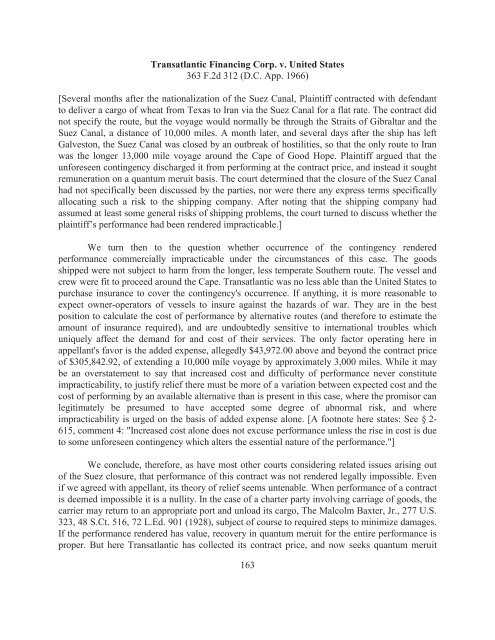Sales and Leases - A Problem-based Approach, 2016a
Sales and Leases - A Problem-based Approach, 2016a
Sales and Leases - A Problem-based Approach, 2016a
Create successful ePaper yourself
Turn your PDF publications into a flip-book with our unique Google optimized e-Paper software.
Transatlantic Financing Corp. v. United States<br />
363 F.2d 312 (D.C. App. 1966)<br />
[Several months after the nationalization of the Suez Canal, Plaintiff contracted with defendant<br />
to deliver a cargo of wheat from Texas to Iran via the Suez Canal for a flat rate. The contract did<br />
not specify the route, but the voyage would normally be through the Straits of Gibraltar <strong>and</strong> the<br />
Suez Canal, a distance of 10,000 miles. A month later, <strong>and</strong> several days after the ship has left<br />
Galveston, the Suez Canal was closed by an outbreak of hostilities, so that the only route to Iran<br />
was the longer 13,000 mile voyage around the Cape of Good Hope. Plaintiff argued that the<br />
unforeseen contingency discharged it from performing at the contract price, <strong>and</strong> instead it sought<br />
remuneration on a quantum meruit basis. The court determined that the closure of the Suez Canal<br />
had not specifically been discussed by the parties, nor were there any express terms specifically<br />
allocating such a risk to the shipping company. After noting that the shipping company had<br />
assumed at least some general risks of shipping problems, the court turned to discuss whether the<br />
plaintiff’s performance had been rendered impracticable.]<br />
We turn then to the question whether occurrence of the contingency rendered<br />
performance commercially impracticable under the circumstances of this case. The goods<br />
shipped were not subject to harm from the longer, less temperate Southern route. The vessel <strong>and</strong><br />
crew were fit to proceed around the Cape. Transatlantic was no less able than the United States to<br />
purchase insurance to cover the contingency's occurrence. If anything, it is more reasonable to<br />
expect owner-operators of vessels to insure against the hazards of war. They are in the best<br />
position to calculate the cost of performance by alternative routes (<strong>and</strong> therefore to estimate the<br />
amount of insurance required), <strong>and</strong> are undoubtedly sensitive to international troubles which<br />
uniquely affect the dem<strong>and</strong> for <strong>and</strong> cost of their services. The only factor operating here in<br />
appellant's favor is the added expense, allegedly $43,972.00 above <strong>and</strong> beyond the contract price<br />
of $305,842.92, of extending a 10,000 mile voyage by approximately 3,000 miles. While it may<br />
be an overstatement to say that increased cost <strong>and</strong> difficulty of performance never constitute<br />
impracticability, to justify relief there must be more of a variation between expected cost <strong>and</strong> the<br />
cost of performing by an available alternative than is present in this case, where the promisor can<br />
legitimately be presumed to have accepted some degree of abnormal risk, <strong>and</strong> where<br />
impracticability is urged on the basis of added expense alone. [A footnote here states: See § 2-<br />
615, comment 4: "Increased cost alone does not excuse performance unless the rise in cost is due<br />
to some unforeseen contingency which alters the essential nature of the performance."]<br />
We conclude, therefore, as have most other courts considering related issues arising out<br />
of the Suez closure, that performance of this contract was not rendered legally impossible. Even<br />
if we agreed with appellant, its theory of relief seems untenable. When performance of a contract<br />
is deemed impossible it is a nullity. In the case of a charter party involving carriage of goods, the<br />
carrier may return to an appropriate port <strong>and</strong> unload its cargo, The Malcolm Baxter, Jr., 277 U.S.<br />
323, 48 S.Ct. 516, 72 L.Ed. 901 (1928), subject of course to required steps to minimize damages.<br />
If the performance rendered has value, recovery in quantum meruit for the entire performance is<br />
proper. But here Transatlantic has collected its contract price, <strong>and</strong> now seeks quantum meruit<br />
163


















